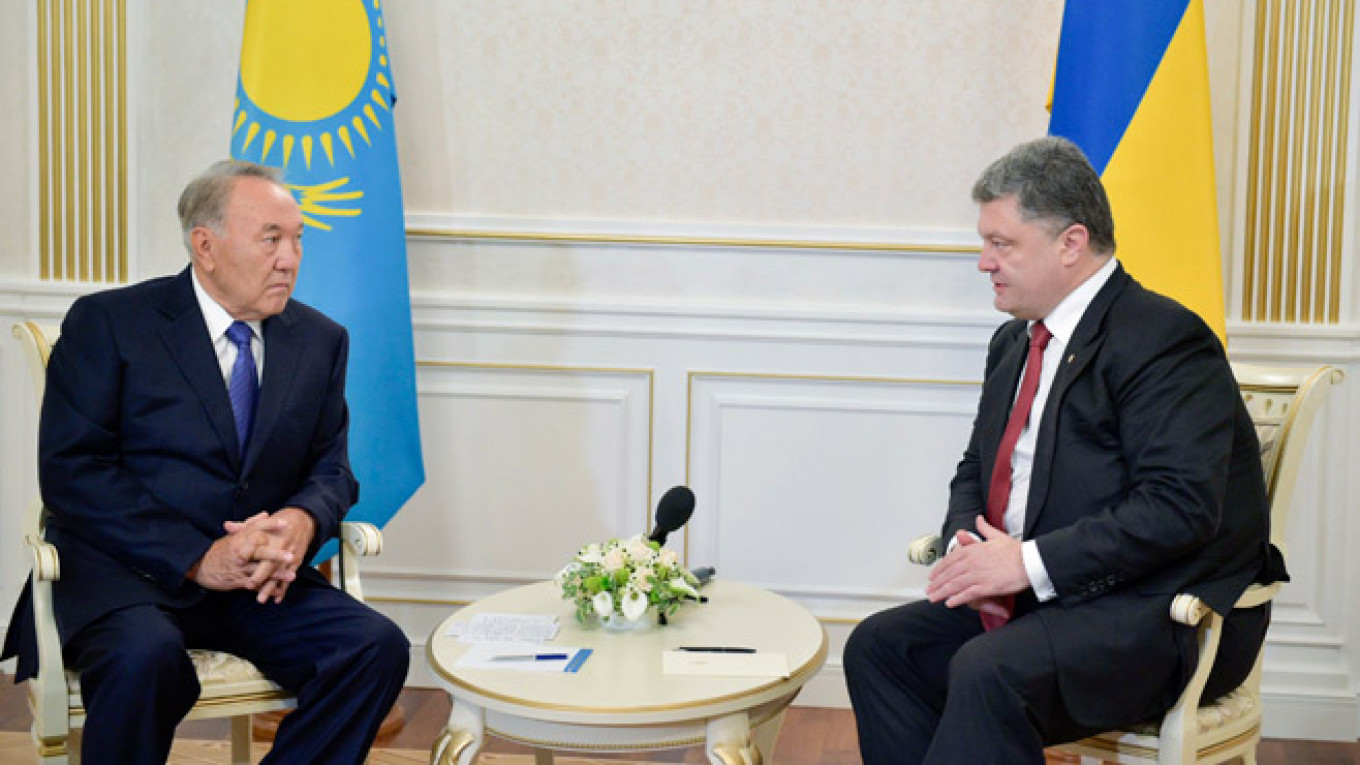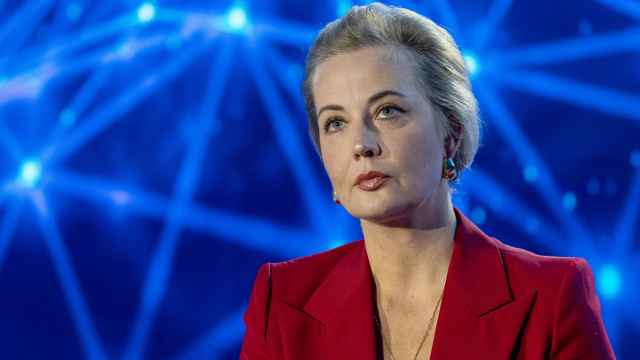Talks in Minsk meant to establish a roadmap to peace in Ukraine have, sadly, led to little else but a grim handshake between Russian President Vladimir Putin and his Ukrainian counterpart, Petro Poroshenko.
Somewhat more positively though, Ukraine, Russia and the EU will hold talks today on the supply of Russian gas. Indeed, the trade connections between the East and West are in many ways central to Ukraine's crisis, which first began over Kiev's decision to sign the EU-Ukraine association agreement.
As European Commission spokesperson Chantal Hughes noted, it is vital that the EU explain why the controversial association agreement does not threaten Russia's interests. If the EU cannot adequately make its case, the current talks are unlikely to bring any lasting peace to the region.
How can lasting peace be achieved? Insightful observers have advocated "Finlandization": the creation of a neutral Ukraine along the lines of post-World War II Finland. This has a chance of success as the primary parties to the conflict — Russia, the West, and both parts of Ukraine — would meet halfway.
But Ukraine is not Finland and will never be.
First, Finland emerged from World War II democratic, united and under the extraordinary leadership of Juho Paasikivi, whose life mission was to reconcile Finnish national aspirations with Soviet interests. Ukraine, meanwhile, is on the verge of disintegration, cleaved between its east and west, and hitherto ruled by dysfunctional governments that have been democratic in the electoral sense only, if that.
Above all, the citizens that have toppled two Ukrainian governments will not voluntarily submit to Finlandization since this would involve, by definition, close ties with Russia and a return to square one from their perspective.
Kazakhstan is a better model. Like Ukraine, a combustible mix of geopolitics and popular aspirations has threatened Kazakhstan's integrity ever since the Soviet Union's collapse. President Nursultan Nazarbayev's response to this welter of pressures has been long-term strategic leadership as a form of insurance to all parties.
Cynics have tended to dismiss this as a self-serving excuse for authoritarian rule. But although Kazakhstan's model is not entirely democratic, it has served the country well over the past 23 years.
Upon independence, Kazakhstan was the only post-Soviet republic in which the titular nationality, Kazakhs, did not make up a majority in their own country.
Externally, Kazakhstan was surrounded by a ring of great powers ready to exert influence — Russia, China, Iran, Pakistan and India — at least four of which possess nuclear weapons. Added to these challenges should be Kazakhstan's religious mosaic of 45 different confessions and 140 nationalities.
Kazakhstan has not only withstood these challenges and prevented a Ukraine-style split but in several ways prevailed. Kazakhstan's civic nation has been praised, and domestic peace preserved. Its economy was the third-fastest growing worldwide from 2000 to 2010, behind only Qatar and China.
It was the first Soviet republic that paid off its debt to the IMF; its oil wealth has been safely deposited in a national oil fund modeled on Norway's; it is a recognized global leader on nuclear disarmament; and Kazakhstan's strategic partnerships with Russia, China and the U.S. are one of a kind.
How did Kazakhstan accomplish this feat? And why did Ukraine spiral down into a vicious circle of ethnic tension and economic crisis?
Sure, Kazakhstan's oil wealth is part of the explanation for the country's success. Ukraine's geographical location, wedged in between Russia and Europe, has not helped Kiev, while European integration is a non-issue in the more distant Kazakhstan.
But natural resources and geography are both secondary to the varying ways in which leadership has been exercised in both nations. Kazakhstan's ability to balance Russia, China and the U.S. and reassure them of their continued influence and the limits thereof has ensured the country's sovereignty and prevented it from becoming a geopolitical prize to be seized.
Kazakhstan has done this by giving the presidency the power necessary to stop factions from imposing ethno-nationalistic, Russia-oriented or Western-oriented policies on recalcitrant parts of the country. This in turn has served to prevent a showdown between external powers seeking to capitalize on political shifts.
Federalization has been opposed in Kazakhstan for the same reason — it would open up the political system to Russian interference. Federalization of Ukraine, as has been proposed, would set similar forces in motion.
The lesson is that confrontation in Ukraine will only end when a strategic direction is in place that reassures external powers and that is credible over time. To this effect, Ukrainian President Poroshenko must set the national interest above those of individuals or groups, and concentrate power, in the spirit of Nazarbayev and former French President Charles de Gaulle, to achieve it.
Other options may sound more appealing, but they will ultimately fail without an empowered president imposing a middle path on Ukraine's divided population and, by extension, their parliamentary representatives.
As James Madison remarked: "You must first enable the government to control the governed and, in the next place, oblige it to control itself." Finland achieved both in its darkest hours, Kazakhstan has moved past the first and is experimenting with the second, but Ukraine started with the second without having the first in place and, true to form, collapsed.
Hence, the reinstatement of Ukraine's 2004 constitution in February, which strengthened the feuding parliament at the expense of the presidency, was inopportune and a recipe for further polarization between the country's eastern and western flanks.
The parliamentary elections slated for October will, in all probability, increase the majority of the Western-leaning parties and further alienate the eastern parts of Ukraine. Neither the separatists nor Russia will accept this "tyranny of the majority."
Ukraine cannot Finlandize its way out of this crisis — if that means a democratically based neutral co-existence project with Russia — since it lacks popular support and would be undermined and exploited by Russia unless protective walls are built around the political system.
And yet, realistically, neutrality is the only peaceful outcome with a chance of success. The grim choice facing Ukraine is continued civil war or a strengthening of the presidency to set the ailing country on a neutral path.
Kazakhstan's experience shows that a strong nationally oriented executive may be a necessary bitter pill to swallow to rein in those forces ripping Ukraine apart. Until this happens, Ukrainians will continue to be divided and fight among themselves with Russian and European support.
Nicklas Norling, Ph.D., is research fellow at the Central Asia-Caucasus Institute & Silk Road Studies Program, a joint trans-Atlantic research center affiliated with Johns Hopkins University-SAIS in Washington and the Institute for Security and Development Policy in Stockholm.
A Message from The Moscow Times:
Dear readers,
We are facing unprecedented challenges. Russia's Prosecutor General's Office has designated The Moscow Times as an "undesirable" organization, criminalizing our work and putting our staff at risk of prosecution. This follows our earlier unjust labeling as a "foreign agent."
These actions are direct attempts to silence independent journalism in Russia. The authorities claim our work "discredits the decisions of the Russian leadership." We see things differently: we strive to provide accurate, unbiased reporting on Russia.
We, the journalists of The Moscow Times, refuse to be silenced. But to continue our work, we need your help.
Your support, no matter how small, makes a world of difference. If you can, please support us monthly starting from just $2. It's quick to set up, and every contribution makes a significant impact.
By supporting The Moscow Times, you're defending open, independent journalism in the face of repression. Thank you for standing with us.
Remind me later.






